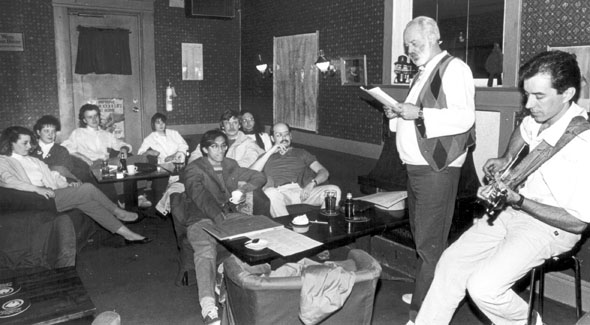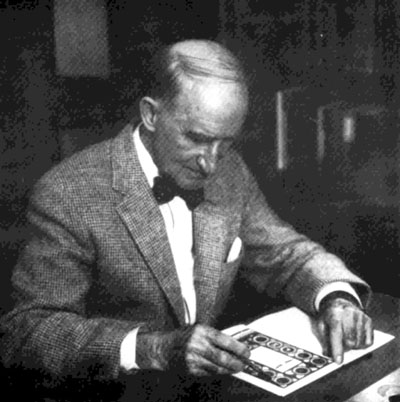 |
May 23, 2003Poetry in Perspective
|
The recent death of a passionate and prolific poet of my acquaintance prompted me to review my file on Mattawa, a place where he and other poets have flourished over the years.
Clifford Whiten (1939-2003)
Clifford J.F. Whiten, who I met in Mattawa in the late 1980’s died on May the 3rd, 2003. Cliff lived for several years in Calvin Township, and later in Mattawa and wrote a lot of prose and poetry about his life
there (see example below). His work appeared regularly in the Mattawa Recorder newspaper. Three books of his poetry, publication in numerous magazines, and many readings have brought his works to the public. After moving to North Bay, he participated regularly in The Conspiracy of Three writers’ group. A memorial evening of his work was held at their May 14 meeting.
 |
| Cliff Whiten reading at the Conspiracy of Three reading group |
When I met Cliff in Mattawa, we soon realized that my wife and I had taught with him in Oshawa in the early 1960’s. He had an M.A. in English and I was working on a degree in English so we hit it off. He was an intense and dedicated teacher who caused something of a stir when he married one of his grade 12 students. They had two beautiful children and divorced. Both children were at the memorial service for Cliff in North Bay at the Martyn Funeral Home where several poets read his work. His former wife Colette Whiten became one of Canada’s best known sculptors.
When I met Cliff 25 years later in Mattawa he and his companion photographer Barb Stevens were about to be married and my wife and I had the honour of standing up for them. I met Cliff occasionally in North Bay over the years, where he conducted classes in creative writing and continued to write.
Wilson MacDonald (1880-1967)
Wilson MacDonald was one of Canada’s leading poets in the first half of the last century. One of his best known poems was written in Mattawa and appears in the preface to Leo Morel’s book Mattawa: The Meeting of the Waters. The poem is about a beautiful,
unforgettable 10-year-old French girl he passed while walking near Mattawa. The poem is call M’sieu, the word used by the girl as she passed. It was published in one of MacDonald’s books Out of the Wilderness which was reprinted nine times over the years. MacDonald’s work has an “unforgetable poignancy” and M’sieu shows this
quality (see excerpt below).
 |
Wilson MacDonald around 1960, "working" on the illustrations for The Lyric Year.-
Photo from Wilson MacDonald Memorial School Museum.
|
When I taught at Burlington Central High School, before moving to Oshawa, Wilson MacDonald did a reading of his poems there to a very enthusiastic audience of staff and students.
I was taking an English course and asked him if I could interview him for a paper I wanted to write. We met several times and I had a chance to view some of his beautiful graphic art and calligraphy.
He was also a practicing magician and on a couple of occasions mesmerized my children with his sleight of hand.
The school he attended at Selkirk, Ontario is now the Wilson MacDonald Museum. (wmacdonald.museum@haldimandcounty.on.ca). There is also a 30 minute video on his life called Wilson MacDonald: His Life and Legacy. (heronwood@execulink.com). A book is pending in the near future.
Len Selle
The Morel book also includes 2 poems by Len Selle who spent 10 years in Mattawa while working on the LeCave Hydro project.
Gordon Dufoe (1892-1976)
A couple of weeks ago I mentioned Mattawa painter Gordon Dufoe’s book. It contained a couple of poems he wrote in his simple direct style The Little Canoe and The Camboose Shanty.
Gerry Therrien and John C. Novak
Gerry and John are published poets who live in Mattawa. Gerry reports on Mattawa events in Community Voices and the Mattawa Recorder and is the author of the history book Mattawa the Timeless Town (1999). His books of poetry are Another Direction North (1979) and Seasons Over Mattawa (1999). The cover of the history book is by artist Clermont Duval who also did the covers of the books of poetry by John Novak, Scraps of Paper, The Naked Lady (1990) and The Story Teller (1996).
In perusing the poetry of Whiten and MacDonald I was struck by the coincidence of a similar theme in a couple of their poems– that of the memory of a passing face that froze in their minds. Whiten’s style is much more modern than MacDonald’s a half century
before.
Girl Passing in a Van – by Cliff Whiten
She smiled, we liked each other for a moment,
Surprised, I think, both of us, to see a man, a pretty face,
in such a solitary place. She and her girlfriend,
Arriving from nowhere, disappearing into nowhere,
Stopping below me to have a first or final look
at the beach, weirs and boats. They drove on.
We might have been friends or lovers or both.
She had a mischievous look, of someone who had escaped.
M’sieu by Wilson MacDonald (one of seven verses)
She came along the roadway
In that fair summer hour,
And softer grew the pine-songs
And fairer bloomed each flower.
And when she passed she raised her eyes,
As bluebells do at dawn,
And cried, “M’sieu,” and courtsied low,
And then went swiftly on.
Many of the poets mentioned here are gone, but all remain in our hearts and minds and remind us of the beauty and wonder of time and
place.
Heritage Perspective Home Page
| 
![]() Past
Forward is now on Facebook "LIKE" us to keep in touch
Past
Forward is now on Facebook "LIKE" us to keep in touch